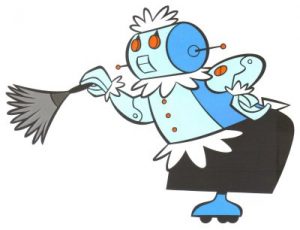Robots are rewriting John Keynes equation of employment
febrero 21, 2017 · Imprimir este artículo
AI is rewriting John Keynes equation of employment
By Denis Sproten.
Back in 1930, Keynes predicted that the working week would be drastically cut, to perhaps 15 hours a week, with people choosing to have far more leisure as their material needs were satisfied. His prediction is slowly becoming true, but not because of satisfied material needs, but more due to automation and eventually AI and robots.
The famous equation about the rate of involuntary unemployment (see left one below) is driven by labor supply and rigid wages.

Supply and demand balance out and set wages, but if labor supply would rise (and demand fall) and wages stay rigid, this would increase involuntary unemployment.
Here are some of my own projections, the point being that salaries keep increasing just with inflation, but real wages have been flat since 1970.

A short introduction, first there were the luddites, destroying machinery, which automated mundane tasks. People tell us, we should be happy that we don’t need to do these anymore. This is all history, from which we moved on:
- Working the fields / weaving: Let’s assume that required a machine with IQ 80 or MIQ of 80, production increased and more products were sold on markets, consumption increased, transportation was needed and distribution of goods into shops. More roads were needed etc, we found a replacement occupation in the next layer.
- Working as a driver / service industry : assume it requires a machine of IQ 100-110, more complex tasks, product knowledge, navigation, forms to be filled, start of knowledge industry. These jobs are being replaced now as we get automated trucks, drones delivering, online shops replacing shops on the street.
- Working in an office Knowledge Industry : assume it requires an IQ of 100-120, even more complex tasks, which involve creation of new products, design, programming, lawyers, accountants, doctors etc. We are not there yet, but we soon will have AI which can do basic tasks of doctors, writing news articles, design thinking, algorithms which categorise knowledge and lets you search it.
.
People are being pushed to become Data Scientists, AI programmers, math geniuses writing algorithms, all jobs which likely require an IQ of 130+. Programs can now write music and are starting to be creative.

The trend I see is that, yes we will be able to find new jobs, but they will require really highly intelligent people, which covers only a small percentage of the population, no matter how much education they have received. Maybe becoming cyborgs will be the answer, if we believe Elon Musk.
 So automation does create new jobs but not as many as it destroys. Inevitably AI and computing will outsmart people and what work will there be left for people to do? One argument which speaks against that is that the more robots and AI we have the more goods they will produce and the cheaper they will become. We will be richer. But who is this «we» group? In the last economic conference at Davos it was announced that in 2010, 43 people were as rich as 50% of the poorest on this earth. In 2016, this has now gone down to 8 people! 8 people as rich as half the world combined.
So automation does create new jobs but not as many as it destroys. Inevitably AI and computing will outsmart people and what work will there be left for people to do? One argument which speaks against that is that the more robots and AI we have the more goods they will produce and the cheaper they will become. We will be richer. But who is this «we» group? In the last economic conference at Davos it was announced that in 2010, 43 people were as rich as 50% of the poorest on this earth. In 2016, this has now gone down to 8 people! 8 people as rich as half the world combined.
This points to the inequality gap becoming bigger and bigger, and only those who own robots will earn an income.
The economic counter-argument is that it will balance itself out, robots will not produce goods which people cannot buy. Or have no money to buy, hence if people lose their jobs there will be less robots producing things. In my opinion, this may balance the economics formula, but not the rate of unemployment.
And so, robots will start producing the goods for people who do have the money, exactly how it is in the world right now. The West produces goods for the western world (at their income rate) and not for 3rd or 4th world countries, where there is very little income. This will increase the inequality even further, effectively raising the rate of unemployment, as less money is spent. Goods will be produced for the rich.
What will countries do to protect themselves? Raise taxes on robots? Factories will just move to a safe-haven country. For now the only savior I see is the IOT industry, which will create millions of jobs installing devices in all sorts of places which require maintenance and support. This will provide even more data to the rich and grow the knowledge industry. Knowledge after all is power!
Source: linkedin.com/pulse, Feb 16, 2017.
Más información:
Los nuevos Paradigmas del siglo XXI – Economía Personal
.
El Mundo está cambiando – Economía Personal
.
El Futuro del Trabajo en el Siglo XXI – Economía Personal
⇒ ¡Descubra las Oportunidades del siglo XXI!
.
Los desafíos del Trabajo en los próximos años – Economía Personal
.
Los avances de la robotización y la destrucción de puestos de trabajo – Economía Personal
.
Vincúlese a nuestras Redes Sociales:
Google+ LinkedIn YouTube Facebook Twitter
.
.





Comentarios
Algo para decir?
Usted debe estar logueado para escribir un comentario.